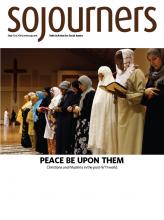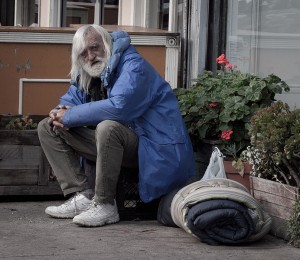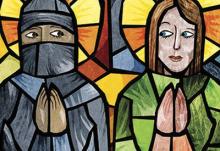Peace and Nonviolence
So what makes the Troy Davis case stand out from most other death penalty cases?
Serious doubt.
Not about whether the death penalty is the appropriate punishment for Davis or has been correctly applied.
The doubt raised in Davis' case is whether he committed the crime at all. And those questions about his guilt have prompted hundreds of thousands of people to raise their voices in opposition to his execution, most recently former FBI Director William Sessions who, in an op-ed in the Atlanta Journal-Constitution Friday, called on the Georgia Board of Pardons and Paroles to commute Davis' sentence to life in prison.
The Gubbio Project, which helps churches become refuges for homeless people throughout the U.S., recently earned a new fan: Author Anne Rice. "When I was in San Francisco, I visited St. Boniface Church in the Tenderloin and was moved by the sight of many peaceful homeless people sleeping in the pews of the church," Rice wrote on her Facebook.com page earlier this month. The author of the Vampire Lestat books and most recently the biblically-themed Christ the Lord novels and her spiritual memoir, Called Out of Darkness, provided her "people of the page" as she calls them, a link to the Gubbio Project where they could donate to "this fine work on the part of the Franciscans of St. Boniface in helping the homeless."
Last Mother's Day, the Violence Prevention Coalition of Los Angeles ran a gun buy-back event where people could exchange firearms for grocery coupons -- no questions asked. The VPC collected more than 2,700 guns that day.
Now some of them are being "up-cycled" -- melted down and re-purposed -- as works of art called "Peace Angels."
Last night, death was interrupted when the U.S. Supreme Court issued a stay of execution for a Texas man convicted of a double murder in Houston in 1995.
Duane Buck was set for execution by lethal injection sometime after 6 p.m., Thursday September 15 in Huntsville, Texas. His execution would have been the second this week and the 11th so far this year in Texas alone. Two more executions are scheduled for next week.
? U.S. troops on the front line believe that the war will go on for another 10 years after they leave.
? An audit shows that the surge of U.S. civilian advisers has cost nearly $2 billion.
? The U.S. mission in Afghanistan has suspended the transfer of detainees to several Afghan jails, following torture allegations.
For every American student, September starts a new year. September was a time to put away the suntan lotion and refocus on studies -- on more serious pursuits. Gone were the carefree days of summer, and in came the weather that lives perfectly in my memory -- those almost orange leaves, crisp blue skies, and the faint smell of autumn in upstate New York.
I remember it like this 10 years ago. Fourteen and gearing up for a Varsity volleyball season, I had it all. I had only one worry -- that my dad would forget to pick me up from practice, which he never did.
My class had just finished homeroom -- it was my friend's 15th birthday. I don't remember singing, but I'm sure we did. I moved into my world history class, I think we were on the Greeks. And then, it changed. My choir teacher rushed in and frantically told us to turn on the television. We saw the hallways fill with teachers.
I woke up on the morning of September 11, 2001 both nervous and excited. I had spent the last two months slowly proceeding through the application and interview process for an entry-level editorial position at Christianity Today to work with their Christian History and Christian Reader magazines. I'd had multiple interviews and had to write a few research heavy articles along the way. For someone with degrees in English and History and a graduate degree in Missions, it seemed like the perfect job. My final evaluation involved joining the staff at an all day off-campus retreat, where they would be evaluating potential articles for magazines. I was a bit nervous, but an insider in the company had told me the job was mine, so the excitement of finally landing my first real job after school prevailed.
So on the morning of September 11, I arrived at the country club where the retreat was being held and situated myself at the conference table in a room with a panoramic view of the far west Chicago suburbs.
Ten years on, I'm remembering the literature I read and the music that kept me going in the days and months after 9/11. I had Rumi and Whitman on my bedside table, reading them back to back, alternating between selections of the Mathnawi and poems from Leaves of Grass, sometimes feeling like the two were one, the soul of America, and that the soul of Islam were intersecting at some point beyond where the eye could see:
Whoever you are!, motion and reflection are especially for you, The divine ship sails the divine sea for you. -- Walt Whitman
Come, come, whoever you are, Wanderer, worshipper, lover of leaving, Ours is not a caravan of despair. Even if you have broken your vows a thousand times It doesn't matter Come, come yet again, come. -- Rumi
Until then, the Quran for me was a book of personal spiritual guidance, a convening symbol for my religious community. But after 9/11, I viewed it as a balm for my country's pain, especially lines from Ayat al-Kursi: "His throne extends over the heavens and the earth, and He feels no fatigue in guarding and preserving them."
On the morning of September 11, 2001, I was at home in Washington, D.C. getting ready to go to Sojourners' office. I was upstairs listening to the news on NPR when I heard the first confusing report of a plane crashing into the south tower of the World Trade Center. I immediately called downstairs to Joy and asked her to turn on the television to see what was going on. Moments later, as we ate breakfast together with our three-year-old son Luke, we watched the second plane strike the north tower. I still remember my first response to Joy, "This is going to be bad, very bad," I said.
Of course, I meant more than just the damage to the Twin Towers and the lives lost, which became far greater than any of us imagined at first. Rather, my first and deepest concern was what something like this could do to our country and our nation's soul. I was afraid of how America would respond to a terrorist attack of this scope.

Loving our neighbors is usually easier in the abstract. The members of Heartsong Church, just outside of Memphis, Tennessee, made that love very real last year in a concrete act of welcome. An Islamic faith community was moving in nearby, and their new center wasn’t going to be ready in time for Ramadan. So the members of Heartsong, in a simple act of Christian hospitality, invited their neighbors to use the church building during the Muslim holy month.
I just returned from a very moving convocation at the Claremont School of Theology where I am on the faculty. We were celebrating the historic founding of a new interreligious theological university that brings together institutions representing the three Abrahamic faiths, along with our newest partner, the Jains. The Jains are an eastern religion founded in India over 2,500 years ago who are perhaps best known for their deep commitment to the concept of no-harm or ahimsa.
While each partner institution will continue to train religious leaders in their own traditions, the Claremont Lincoln University will be a space where future religious leaders and scholars can learn from each other and collaboratively seek solutions to major global issues that no one single religion can solve alone. The CLU's founding vision of desegregating religion was reflected in the extraordinary religious diversity present at the convocation held in a standing room-only auditorium. I sat next to a Jewish cantor and a Muslim woman who had tears flowing down her face as we listened to the prayers offered in all four religions along with a reflection from a Humanist speaker.
Two long pieces this weekend described "one hell of a killing machine," and "the dark matter
On his radio show last week, Glenn Beck read a vow of nonviolence, which he said he'd been working on for about a year, and pleaded his followers to take it as well. The pledge itself is actually quite good, and even Gandhian, at parts. Here is an excerpt:
Today, quarters of the Earth are endangered by tyranny, discrimination, barbarism, and subjugation by fellow man. With an understanding of basic rights and equal justice, we must remain loyal to God and deliver the rights which [God's] benevolence has bestowed upon us to those who have been denied the blessings of liberty, justice, and equality. More importantly, we must protect them from being robbed in the future, so that forever the world may be safe, and her people free from malevolence. Together, we must be prepared to do our duty no matter the cost and we must do so inexorably. We must march forth steadfast and unconquerable and defeat the forces of evil not by sword, but through our love for mankind and his creator.

A conservative Republican member of Congress talks about his journey of repentance for supporting the U.S. wars in Iraq and Afghanistan.
ROTC is back on campuses -- but military thinking still conflicts with the life of the mind.
Loving our neighbors is usually easier in the abstract. The members of Heartsong Church, just outside of Memphis, Tennessee, made that love very real last year in a concrete act of welcome. An Islamic faith community was moving in nearby, and their new center wasn’t going to be ready in time for Ramadan. So the members of Heartsong, in a simple act of Christian hospitality, invited their neighbors to use the church building during the Muslim holy month.
Please continue to address the importance of promoting and building peace ("The Things that Make for Peace," by Jim Wallis, July 2011), whether in Afghanistan, Palestine-Israel, Libya, or right here at home, rather than simply opposing our nation's current wars.


